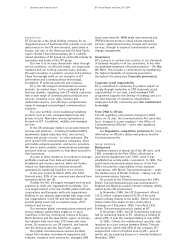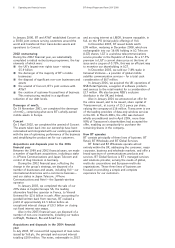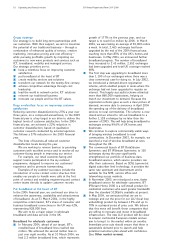BT 2004 Annual Report Download - page 18
Download and view the complete annual report
Please find page 18 of the 2004 BT annual report below. You can navigate through the pages in the report by either clicking on the pages listed below, or by using the keyword search tool below to find specific information within the annual report.to equal opportunities. We also work closely with the
Employers’ Forum on Disability.
Learning and flexibility
In addition to culture change programmes, such as my
customer, during the year we spent over £61 million
(excluding staff and other direct costs) on the training
and development of our employees.
We have also increased the emphasis on
broadband, e-learning and self-teach opportunities.
This is particularly important as we extend our
practices of flexible working. At 31 March 2004, we
had around 500 job sharers, 5,570 people working
part time and more than 7,900 people working from
home.
Research and development and IT support
BT Exact is BT’s research, technology and IT
operations business. It offers expertise and experience
in ICT, backed by a team of over 6,000 technologists
and one of the world’s largest communications
research and development facilities. The work
undertaken by BT Exact is part of an investment of
£334 million in research and development made by BT
in the 2004 financial year. This compares with
£380 million and £362 million invested in the 2003
and 2002 financial years, respectively.
At BT Exact’s core are our world-renowned
laboratories at Adastral Park near Ipswich, which have
been responsible for some of the world’s most
far-reaching advances in telecommunications
technology, including the advancement of single-mode
optical fibre and of the technology and worldwide
standards behind passenger phones on aircraft and
videoconferencing.
Brightstar – BT’s business ‘‘incubator’’ with the
goal of commercialising our patent portfolio – was
created in January 2000. In March 2003, BT Exact
teamed up with Coller Capital and New Venture
Partners (NVP) to create a new, independent corporate
venturing partnership – NVP Brightstar.
BT remains a limited partner and NVP Brightstar
remains closely associated with BT Exact through
exclusive rights to continue to spin-out companies
from its R&D, professional and computing services
base. This venturing unit complements our existing
patent licensing programme, for which we have an
exclusive long-term arrangement with Silicon Valley-
based IPValue Management Inc.
Regulation, competition and prices
The commercial environment in the UK and in the
countries in which BT operates is increasingly
competitive and dynamic. However, we remain subject
to extensive regulation, particularly in the UK, which
can materially affect the way in which we carry out our
business. We also use inputs, such as networks and
services from other regulated operators, largely outside
the UK, and the availability and price of these inputs
may change from time to time, which in turn affects
our business.
Regulation in the UK
It is our policy to be fully compliant with the regulatory
framework in which we operate. During the 2004
financial year, we reviewed our compliance activities
because we want to ensure that we continue to meet
the obligations imposed by the UK’s Communications
Act (previously the Telecommunications Act) and the
Competition Act while competing fairly and vigorously
within the rules. We have published an annual
compliance report which can be found in our social and
environment report at www.bt.com/betterworld.
Ofcom
The UK regulatory environment changed materially in
2003. On 25 July 2003, the Communications Act
2003 (‘‘the Communications Act’’) came into force,
bringing in a new regulator, the Office of
Communications (Ofcom), and a new regulatory
framework for electronic communications networks and
services. Ofcom did not, however, assume its
regulatory functions until 29 December 2003 and, in
the transitional period, the existing regulators
continued to carry out Ofcom’s functions relating to
networks and services, and spectrum.
Ofcom was set up, as a result of the increasing
convergence between telecommunications,
broadcasting and radio, to provide a single, seamless
approach to regulation across the whole converging
marketplace. It amalgamates the roles of five former
regulatory agencies: the Director General of
Telecommunications (Oftel), the Independent
Television Commission, the Broadcasting Standards
Commission, the Radio Authority and the
Radiocommunications Agency.
Ofcom is headed by a board consisting of a
chairman and executive and non-executive members.
Currently, the chairman is Lord Currie and the chief
executive is Stephen Carter.
The main regulatory changes for providers of
electronic communications networks and services are:
&the regulator’s ability to impose conditions
without agreement
&the possibility of fines being imposed for breach of
regulatory obligations
&the availability of appeals against regulatory
decisions, based on their merits
&the creation of a new regulatory regime which,
among other things, implements the requirements
of the new EU Directives for general
authorisations, instead of individual licences, and
bases economic regulation on dominance, or
‘‘significant market power’’ (SMP).
Ofcom’s duties and powers
Ofcom has a wide range of general and specific duties
laid down in the Communications Act. Below is a
summary of those duties and functions of particular
relevance to BT’s activities:
&the principal duty to further the interests of
citizens in relation to communications matters
and, secondly, to further the interests of
consumers, where appropriate, by promoting
competition. In doing so, Ofcom must secure,
17 Operating and financial review BT Annual Report and Form 20-F 2004
























